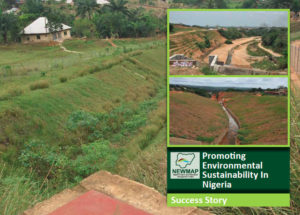South-South Learning and Knowledge Sharing for watershed management, infrastructure and agriculture: World Bank task teams secured financing from the China-World Bank Group Trust Fund of USD 433,000 over 2.5 years to enhance South-South knowledge sharing between China, India, and Nigeria. The Trust Fund is supporting important knowledge sharing and learning between China, India and Nigeria, focusing on infrastructure development associated with major land and gully restoration, agricultural development and climate smart agriculture on restored lands, and applications of remote sensing, GIS, and Decision Support Systems (DSS) for more effective project management and M&E. These activities would primarily benefit the outcomes of the Nigerian Erosion and Watershed Management Project (NEWMAP), the new Neeranchal National Watershed Project in India and the FADAMA project in Nigeria.
There is a wealth of accumulated knowledge and experience in China (and India) on addressing similar issues. These include for example, World Bank-supported Loess Plateau Projects, the Ningxia Desertification Control and Ecological Protection Project, and a range of road improvement projects in China. In India, the Karnataka Watershed Development Project (2012-2018) in India is demonstrating cutting edge technology to help plan, prioritize, monitor and assess interventions in nine predominantly rain-fed districts. Both China and India have a long history of successful Bank-supported sustainable land management programs, designed to improve water management, agricultural productivity, rural livelihoods, and build resiliency to climate change. At the same time, the NEWMAP project is piloting innovative approaches with gully restoration that could be of specific interest to both China and India. There are good examples from China and India that can provide useful technical inputs. Activities of the South-South knowledge sharing will inform critical activities including: a) gully restoration design, construction, physical works, and vegetative interventions; b) landscape restoration and agricultural and pastoral improvement in arid, rainfed areas; application of remote sensing, GIS, and DSS for more effective project management and M&E; and c) urban and peri-urban road design and management of surface water runoff (the main cause of gullies in southern Nigeria). The activities would also support the transfer of applied research and development results in key areas, for example on the economics of gully restoration and adopting innovative and climate friendly practices, drawing from Chinese and Indian experiences.
The conference will commence with building on current experiences of participants and will, over the course of the 3 days, narrow down to the specific desired outcomes. The conference will be organized around professional updating, interactive learning and presentations. The conference will start on October 4th 2017. The closure will be on October 6th, 2017.
The conference will take place during the International Space Week from 4th to 6th October, 2017, in Sheraton Hotel Abuja, Nigeria by 10: AM.

